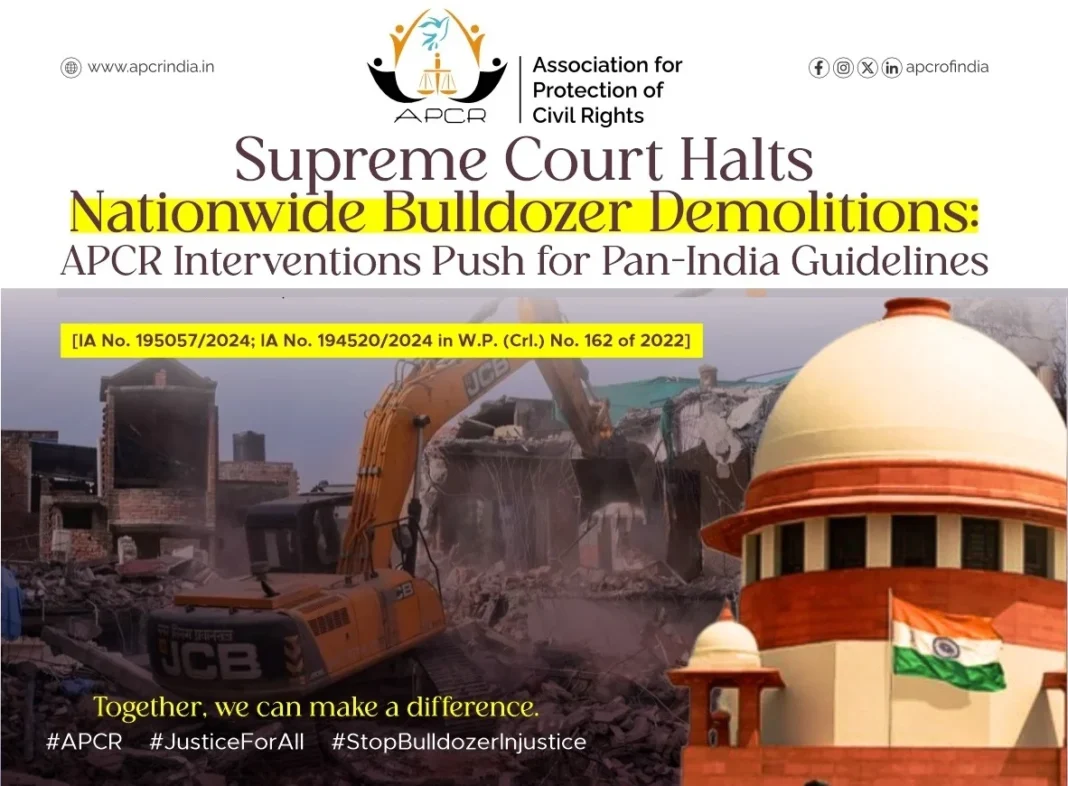Anwarulhaq Baig
NEW DELHI: In a significant ruling, the Supreme Court of India has temporarily halted all demolitions across the country in response to a petition from the Jamiatul Ulama Hind and interventions by the Association for Protection of Civil Rights (APCR). The bench, led by Justices B.R. Gavai and K.V. Viswanathan, issued the order during hearing the petition regarding the misuse of executive power in punitive demolitions affecting marginalized and minority communities.
The court has directed that no demolitions should carry out without its explicit permission, providing crucial relief to victims who have faced demolition based on mere allegations. This interim measure will remain in effect until the next hearing on October 1, 2024.
Reacting on the judgement, the APCR in a statement, states, “the APCR has successfully intervened in the Supreme Court to pause nationwide bulldozer demolitions targeting marginalized communities.”
The APCR highlighted cases from Udaipur and Jaora, where individuals like Rashid Khan and Mohammad Hussain have experienced demolitions linked to accusations against their tenants and family members.
The civil rights body stated that on behalf of victims facing bulldozer demolitions, senior Advocate C.U. Singh represented interventions facilitated by the APCR. “These interventions, filed under [IA No. 195057/2024; IA No. 194520/2024 in W.P. (Crl.) No. 162 of 2022], were presented by Senior Advocate C.U. Singh and the legal team, including Advocate of Record Fauzia Shakeel, Advocate of Record Ujjawal Singh, Advocates Shivansh Saxena, Tasmiya Taleha, and M Huzaifa,” the APCR added.
Advocate Singh, representing the victim, underscored the alarming trend of demolitions following allegations of misconduct, including incidents that occurred immediately after unrest.
During hearing, Advocate Singh represented victims facing bulldozer demolitions and emphasized the alarming trend of such actions despite prior court orders. He cited a specific case in Jahajpur, Rajasthan, where demolitions occurred immediately following allegations of stone-pelting, underscoring the misuse of executive authority. In the courtroom, justifying the demolitions, Solicitor General Tushar Mehta contended that notices were served in 2022 and that the demolitions followed offenses committed afterward. However, criticizing the practice of demolitions as punitive measures, Justice Gavai noted that while the court would not interfere with unauthorized constructions, the executive cannot act as a judge in these matters.
Justice Gavai also directed the state governments to be informed and reiterated the court’s earlier stance against the use of demolitions as punitive measures. The Supreme Court has also issued notices to the governments of Rajasthan and Madhya Pradesh in response to two interventions filed by the APCR on behalf of the victims. These cases involve Rashid Khan, whose house was demolished due to allegations against his tenant’s minor son, and Mohammad Hussain, whose ancestral home with multiple owners was partially demolished following accusations against his son .
The court expressed concern over the use of demolitions as punishments, questioning how a house could be demolished solely based on accusations. The APCR has also drafted guidelines for the prevention of punitive demolitions across India, in consultation with civil society, proposing frameworks for due process, accountability mechanisms for authorities, and compensation for victims. These submissions are set to be reviewed in an upcoming hearing. The court issued an interim order pausing bulldozer actions for approximately two weeks, mandating that no demolitions occur without explicit permission. This order provides temporary relief to victims of arbitrary demolitions and reinforces the court’s stance against punitive ‘bulldozer justice’.

